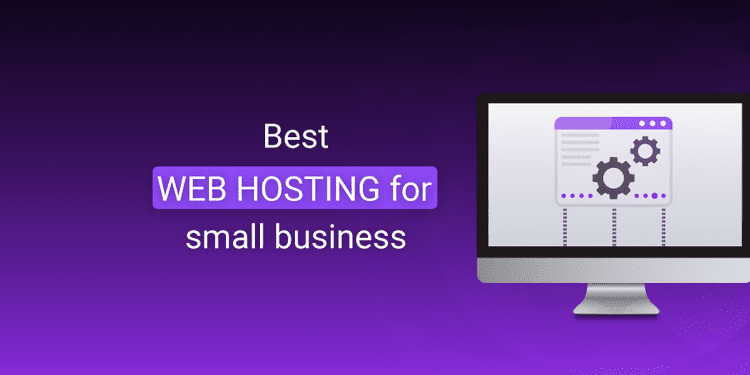Which Web Hosting Is Best for Small Businesses

Are you tired of sifting through an overwhelming amount of web hosting options, unsure which one will truly benefit your small business?
When it comes to choosing the right web hosting service for your small business, the stakes are high, and making the wrong choice can have significant consequences.
But fear not, as we are here to guide you through the intricate web of hosting solutions available, helping you make an informed decision that aligns perfectly with your business needs.
Shared Hosting
Shared hosting is a cost-effective option for small businesses looking to host their websites on a server that’s shared with other websites. With shared hosting, multiple websites reside on a single server, sharing its resources such as storage, bandwidth, and processing power. This setup is ideal for businesses with moderate website traffic and relatively simple website needs.
One of the key advantages of shared hosting is its affordability. By sharing the costs of server maintenance and operation with other websites, small businesses can enjoy hosting services at a fraction of the cost of dedicated hosting. Additionally, shared hosting providers typically handle server management tasks, such as software updates and security patches, relieving businesses of these responsibilities.
However, shared hosting may not be suitable for websites with high traffic volumes or advanced technical requirements. Since resources are shared among multiple websites, performance can be affected if other sites on the server experience spikes in traffic or resource usage. It’s essential for businesses to assess their hosting needs carefully before opting for shared hosting to ensure it aligns with their requirements.
Virtual Private Server (VPS)
Virtual Private Server (VPS) hosting provides small businesses with dedicated resources on a virtualized server environment, offering more control and scalability compared to shared hosting. With VPS hosting, you have your own virtual server that mimics the experience of a dedicated server but within a shared hosting environment. This means you can customize your server configurations, install specific software, and have more predictable performance since other websites’ activities won’t impact your site as much.
Dedicated Server
When considering a dedicated server for your small business website, you’re opting for a robust hosting solution that offers superior performance and reliability.
While it may come at a higher cost compared to shared hosting, dedicated servers provide the resources and customization options necessary for a growing business.
With the ability to handle high traffic volumes and complex applications, a dedicated server ensures your website operates smoothly and securely.
Cost-Effective Hosting Solutions
For small businesses seeking reliable hosting with full control and high performance, a dedicated server solution may offer the cost-effective option needed to meet your growing demands.
With a dedicated server, you have exclusive use of the server hardware, ensuring optimal performance for your website or applications.
While the initial cost may be higher than shared hosting, the long-term benefits include increased security, customization options, and scalability to accommodate your business expansion.
Additionally, dedicated servers provide better reliability and uptime compared to shared hosting environments.
Performance and Reliability
To maximize the performance and reliability of your website or applications, consider opting for a dedicated server solution that offers exclusive use of server hardware. With a dedicated server, you have full control over the server environment, allowing you to customize it to meet your specific needs. This can result in improved speed, security, and overall performance for your online presence. Dedicated servers also offer greater reliability as they are not impacted by other users sharing the server resources. When choosing a dedicated server hosting provider, ensure they offer robust hardware, reliable network connectivity, and excellent support services to ensure your website or applications run smoothly.
Cloud Hosting
Cloud hosting offers scalable and flexible solutions for businesses seeking efficient web infrastructure. With cloud hosting, your website is hosted on a virtual server network rather than a single physical server. This means that resources can be dynamically allocated based on your website’s needs, ensuring optimal performance during traffic spikes. The scalability of cloud hosting allows you to easily adjust resources as your business grows, preventing downtime and ensuring seamless user experience.
One key benefit of cloud hosting is its reliability. Your website data is distributed across multiple servers, reducing the risk of downtime due to server failures. Additionally, cloud hosting providers often have robust security measures in place to protect your data from cyber threats.
Moreover, cloud hosting offers cost-effective solutions for small businesses. You only pay for the resources you use, making it a budget-friendly option compared to traditional hosting plans. With its flexibility, scalability, reliability, and cost-effectiveness, cloud hosting is an excellent choice for small businesses looking to establish a strong online presence.
Managed WordPress Hosting
Hosting your WordPress website can be made simpler through Managed WordPress Hosting services. This type of hosting is specifically optimized for WordPress sites, offering features such as automatic updates, enhanced security, and expert support tailored to the WordPress platform. By choosing Managed WordPress Hosting, you can focus more on growing your business and creating content, while the hosting provider takes care of the technical aspects of managing your website.
E-commerce Hosting
For small businesses looking to establish an online store, selecting the right e-commerce hosting solution is crucial for ensuring smooth transactions and secure customer data. When choosing an e-commerce hosting provider, consider the following key factors:
- Security Features: Opt for a hosting provider that offers SSL certificates, secure payment gateways, and regular security updates to protect your customers’ sensitive information.
- Scalability: Ensure that the hosting plan can accommodate your business growth. Look for options that allow you to easily upgrade resources as your online store expands.
- Uptime and Reliability: Select a hosting provider with a proven track record of high uptime percentages to prevent potential revenue loss due to website downtime.
- E-commerce Specific Features: Look for features tailored to e-commerce, such as cart functionality, inventory management tools, and seamless integration with popular payment gateways like PayPal or Stripe.
Reseller Hosting
Consider the benefits of reseller hosting for small businesses seeking to expand their service offerings and generate additional revenue streams through web hosting solutions. Reseller hosting allows you to purchase hosting services in bulk from a provider and then resell them to your clients. This can be a lucrative option for small businesses looking to enter the web hosting market without the need to invest in infrastructure or manage server maintenance.
With reseller hosting, you can offer a range of hosting plans to your customers, allowing you to cater to different needs and budgets. This flexibility enables you to target a broader customer base and potentially increase your profits. Additionally, reseller hosting typically comes with white-label branding options, allowing you to promote your hosting services under your own brand name, enhancing your business’s credibility and professionalism.
Furthermore, reseller hosting often includes tools and resources to help you manage your hosting business efficiently, such as billing software, customer support, and technical assistance from the provider. This support can save you time and resources, allowing you to focus on growing your hosting business and serving your clients effectively.
Green Hosting
When looking for environmentally-friendly web hosting solutions, small businesses can explore the concept of Green Hosting to reduce their carbon footprint. Green Hosting providers focus on utilizing renewable energy sources and implementing eco-friendly practices to minimize environmental impact.
Here are key aspects to consider when evaluating Green Hosting options:
- Energy-Efficient Data Centers: Green Hosting companies often operate data centers powered by renewable energy sources such as wind or solar power, reducing reliance on traditional fossil fuels.
- Carbon Offsetting Initiatives: Some Green Hosting providers invest in carbon offset projects to neutralize the environmental impact of their servers, making your website’s carbon footprint effectively zero.
- Resource Optimization: Green Hosting services prioritize resource efficiency, optimizing server usage to minimize energy consumption and waste.
- Environmental Certifications: Look for Green Hosting providers that hold certifications like Energy Star or are part of environmental initiatives to ensure their commitment to sustainability.
Free Hosting
Exploring sustainable hosting options is essential for small businesses; now shifting focus to ‘Free Hosting’, where cost efficiency becomes a primary consideration in selecting a hosting provider. When considering free hosting, it is crucial to weigh the benefits against the limitations. While free hosting can be appealing due to the lack of upfront costs, it often comes with restrictions such as limited storage, bandwidth, and fewer features compared to paid hosting plans. Below is a comparison table highlighting key aspects to consider when opting for free hosting.
While free hosting can be suitable for small websites or personal projects with minimal traffic, businesses requiring more robust features and support may find paid hosting more suitable. It’s essential to evaluate your specific needs and long-term goals before deciding on a hosting solution.
Frequently Asked Questions
How Do I Know if My Small Business Is Ready to Upgrade From Shared Hosting to a VPS or Dedicated Server?
When considering upgrading from shared hosting to a VPS or dedicated server, assess your website’s traffic, performance demands, and security needs. Monitor load times, visitor volume, and site stability to determine the best solution for your growing business.
What Security Measures Should Small Businesses Consider When Choosing a Web Hosting Provider?
When choosing a web hosting provider for your small business, consider security measures like SSL certificates, regular backups, firewall protection, and DDoS prevention. Ensure the provider offers robust security features to protect your website and data.
What Are the Key Differences Between Cloud Hosting and Managed WordPress Hosting for Small Businesses?
When comparing cloud hosting and managed WordPress hosting, consider scalability and control. Cloud hosting offers flexibility and resources on-demand, while managed WordPress hosting focuses on optimized performance and support for WordPress-specific needs. Choose based on your priorities.
How Can Small Businesses Effectively Scale Their Online Presence With E-Commerce Hosting Solutions?
To effectively scale your online presence with e-commerce hosting solutions, ensure your provider offers scalable resources, secure payment gateways, SSL certificates, and reliable customer support. Optimizing for speed, uptime, and user experience is crucial.
What Are the Benefits of Reseller Hosting for Small Businesses Looking to Offer Hosting Services to Their Clients?
When looking to offer hosting services to clients, reseller hosting offers benefits like scalability, white-label options, and cost-effectiveness. It allows you to manage multiple accounts easily, offering your clients reliable hosting solutions tailored to their needs.
Conclusion
In conclusion, when choosing a web hosting service for your small business, consider factors such as budget, scalability, and security. Shared hosting is cost-effective but may lack resources, while VPS provides more control and flexibility.
Dedicated servers offer maximum performance, but at a higher cost. Cloud hosting is scalable and reliable, while managed WordPress hosting is optimal for WordPress websites.
E-commerce hosting caters to online stores, reseller hosting allows you to sell hosting services, and green hosting promotes environmental sustainability. Choose the best option based on your business needs.





